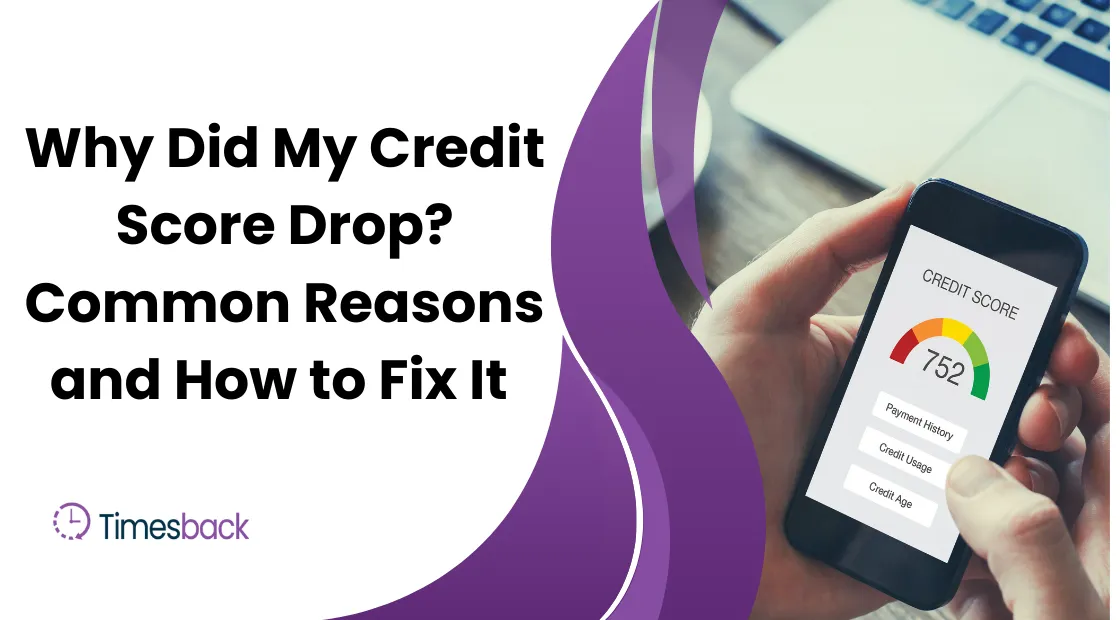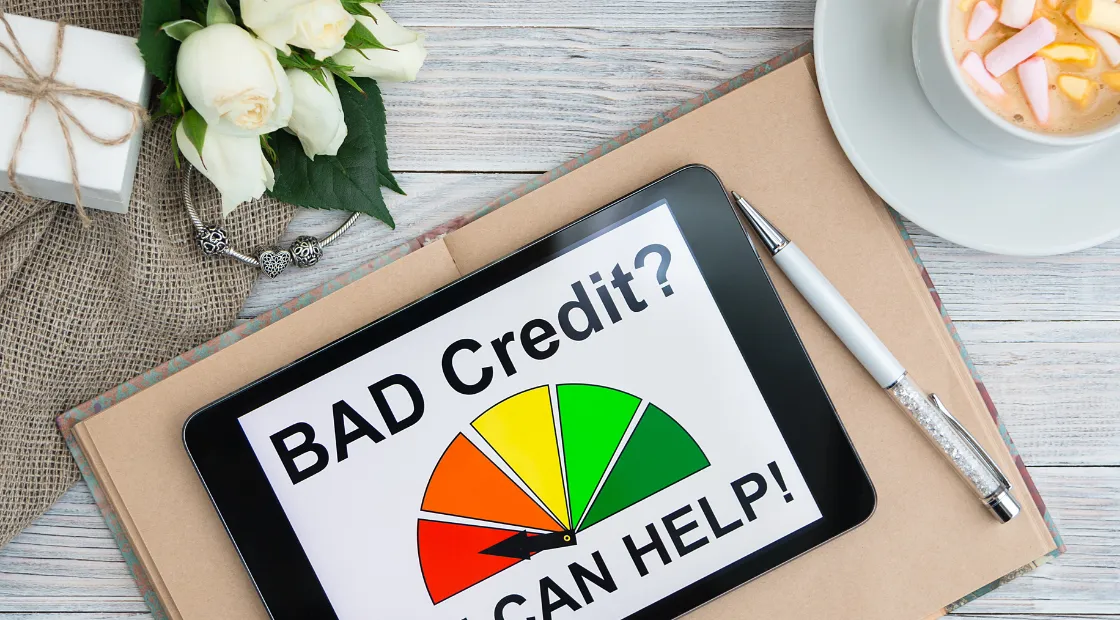Perché il mio punteggio di credito è sceso? Cause comuni e come risolverlo

Poche sorprese finanziarie sono frustranti quanto accedere al proprio rapporto di credito e vedere un imprevisto calo del punteggio di credito.
Annunci
Che tu stia pensando di richiedere un mutuo, rifinanziare un prestito o semplicemente mantenere una buona salute finanziaria, un calo improvviso può sembrare una battuta d'arresto.
Ma prima che si faccia prendere dal panico, è fondamentale comprendere i meccanismi alla base di queste fluttuazioni e, cosa ancora più importante, come invertirle.
A differenza dei prezzi delle azioni, che reagiscono alla volatilità del mercato, i punteggi di credito seguono un modello di punteggio preciso, anche se a volte sconcertante.
Annunci
I cinque fattori chiave (cronologia dei pagamenti, utilizzo del credito, durata della cronologia creditizia, mix di credito e nuovo credito) interagiscono in modi non sempre intuitivi.
Un singolo pagamento mancato o una richiesta impulsiva di carta di credito possono innescare un calo del punteggio di credito, anche se le tue abitudini generali sono solide.
Quindi, cosa causa realmente questi cali e come è possibile attenuarli?
Di seguito analizzeremo i colpevoli più comuni, supportati da dati, esempi concreti e soluzioni concrete.
I fattori scatenanti nascosti dietro un calo del punteggio di credito
1. Elevato utilizzo del credito: il killer silenzioso del punteggio
Il tasso di utilizzo del credito, ovvero la percentuale di credito disponibile che stai utilizzando, è il secondo fattore più influente sul tuo punteggio (dopo la cronologia dei pagamenti).
Sfruttare al massimo le carte, anche temporaneamente, può far diminuire rapidamente i punti.
Esempio: Immagina due mutuatari:
- Alex ha un limite di $10.000 e utilizza costantemente $9.000 (utilizzo 90%).
- Jamie ha lo stesso limite ma mantiene i saldi al di sotto di $3.000 (30%).
Nonostante redditi simili, Alex calo del punteggio di credito potrebbe essere più ripido di 50+ punti a causa dell'elevato utilizzo.
La soluzione? Rimborsare i saldi prima della chiusura degli estratti conto o richiedere un aumento del limite di credito senza spendere di più.
Tabella 1: Impatto dell'utilizzo del credito sui punteggi FICO
| Tasso di utilizzo | Impatto del punteggio stimato |
|---|---|
| 0-9% | +10-30 punti |
| 10-29% | Da neutro a leggero |
| 30%+ | da -10 a -50 punti |
| 70%+ | da -50 a -100 punti |
Inoltre, mantenere un basso tasso di utilizzo può segnalare ai creditori che sei un mutuatario responsabile.
Ciò può aumentare le tue possibilità di ottenere condizioni di prestito migliori in futuro.
Monitorare regolarmente l'utilizzo del credito e apportare modifiche può aiutarti a rimanere sulla buona strada.
2. Pagamenti in ritardo: una macchia persistente
Un solo pagamento in ritardo di 30 giorni può far crollare il tuo punteggio fino a 110 punti (dati FICO).
Quel che è peggio è che resta nel tuo report per sette anni, anche se il suo impatto svanisce col tempo.
Consiglio da professionista: Se non rispetti una scadenza, chiama immediatamente il creditore.
Molti offrono un "adeguamento di buona volontà" una tantum se sei un cliente affidabile.
Per evitare ritardi nei pagamenti, impostare pagamenti automatici o promemoria può rivelarsi una soluzione rivoluzionaria.
Inoltre, gestire le bollette in modo ordinato può prevenire futuri imprevisti e mantenere intatto il tuo punteggio di credito.
+ Finanza da nomade digitale: gestire il credito e le tasse oltre i confini
3. Richieste approfondite: la spada a doppio taglio del nuovo credito
Ogni richiesta specifica (ad esempio, la richiesta di un prestito o di una carta) può far diminuire il tuo punteggio di 5-10 punti.
Sebbene si tratti di un problema di scarsa entità, più richieste in un breve arco di tempo rappresentano un rischio per i creditori.
Eccezione: La ricerca del tasso di interesse per mutui o prestiti auto entro un periodo di 14-45 giorni (a seconda del modello di punteggio) conta come una singola richiesta.
Per ridurre al minimo l'impatto delle richieste approfondite, è necessario adottare una strategia per decidere quando e con quale frequenza richiedere un nuovo credito.
Prima di presentare la domanda, ti consigliamo di controllare il tuo punteggio di credito per assicurarti di essere in una posizione favorevole.

4. Conti chiusi: guadagno a breve termine, sofferenza a lungo termine
Chiudere una vecchia carta di credito sembra una cosa innocua, vero?
Sbagliato. Riduce il credito totale disponibile, aumentandone l'utilizzo e potrebbe accorciare l'età media della tua storia creditizia, due fattori che incidono negativamente sul tuo punteggio.
Analogia: Pensate alla storia creditizia come a un vigneto.
Le viti più vecchie (conti) producono frutti più ricchi (forza creditizia).
Sradicarli sconvolge l'ecosistema.
Inoltre, mantenere aperti conti più vecchi può migliorare il tuo profilo creditizio, dimostrando un rapporto di lunga data con il credito.
Si consiglia di utilizzarli occasionalmente per piccoli acquisti, in modo da mantenerli attivi senza incorrere in un utilizzo eccessivo.
++ La differenza tra debito buono e debito cattivo
Motivi meno ovvi per un calo del punteggio di credito
5. Errori nel rapporto di credito: il ladro invisibile
Uno studio della FTC del 2021 ha rilevato che 1 consumatore su 5 presentava errori nei propri rapporti di credito.
Un pagamento in ritardo segnalato erroneamente o un conto fraudolento potrebbero farti fallire.
Fase d'azione: Ottieni report gratuiti da AnnualCreditReport.com e contesta le inesattezze tramite il CFPB.
Controllare regolarmente il tuo rapporto di credito può aiutarti a individuare tempestivamente gli errori e a prevenire potenziali danni al tuo punteggio.
Monitorare in modo proattivo il tuo credito può salvarti da spiacevoli sorprese in futuro.
6. Prestiti estinti: un colpo paradossale
Controintuitivamente, saldare un prestito rateale (come una cambiale per un'auto) può causare un danno minore calo del punteggio di credito.
Perché? Riduce il tuo mix creditizio, un fattore di punteggio piccolo ma significativo.
Esempio: Sarah ha saldato il suo prestito studentesco, ma il suo punteggio è sceso di 12 punti.
La soluzione? Mantenere nel tempo un mix diversificato di crediti (ad esempio, carte di credito, mutui e prestiti rateali).
Mantenere un equilibrio tra diversi tipi di credito può migliorare il tuo profilo creditizio e contribuire ad attenuare i cali del punteggio.

Tabella 2: Come il mix di crediti influenza i punteggi
| Tipi di credito attivi | Impatto del punteggio |
|---|---|
| 3+ (ad esempio, carta, mutuo, prestito) | +10-20 punti |
| 2 | Neutro |
| 1 | -5-15 punti |
Come riprendersi da un calo del punteggio di credito
- Automatizza i pagamenti – Elimina le penali per il ritardo con gli avvisi del calendario o il pagamento automatico.
- Ridurre l'utilizzo in modo strategico – Punta a <10% per carta, non solo in generale.
- Diventa un utente autorizzato – Sfrutta la cronologia immacolata delle carte di un membro della famiglia.
- Congela il tuo credito – Bloccare le richieste di informazioni non autorizzate tramite Experian, Equifax o TransUnion.
Oltre a questi passaggi, rivedere regolarmente le proprie abitudini finanziarie può portare a una migliore gestione del credito.
Se non sei sicuro di come migliorare efficacemente il tuo punteggio di credito, valuta la possibilità di rivolgerti a un consulente finanziario.
Per maggiori informazioni sui punteggi di credito e su come gestirli in modo efficace, puoi visitare Portafoglio Nerd.
Considerazione finale: il panico è giustificato?
UN calo del punteggio di credito non è sempre catastrofico.
I piccoli cali dovuti a richieste di informazioni o prestiti estinti spesso si riprendono nel giro di qualche mese.
Ma i problemi cronici (elevato utilizzo, mancati pagamenti) richiedono un intervento.
Chiediti: Il calo del mio punteggio è un livido temporaneo o il sintomo di abitudini finanziarie più profonde?
Diagnosticando la causa principale e agendo rapidamente, non solo recupererai i punti persi, ma rafforzerai anche le tue basi finanziarie contro future sorprese.
Inoltre, comprendere le dinamiche del tuo punteggio di credito può aiutarti a prendere decisioni finanziarie consapevoli.
Per ampliare le tue conoscenze, valuta la possibilità di cercare risorse su siti web finanziari affidabili.
